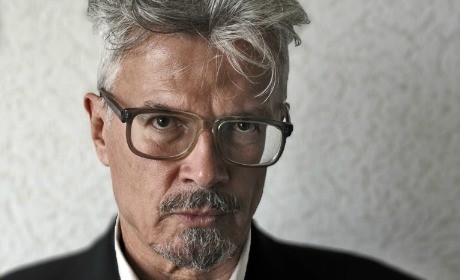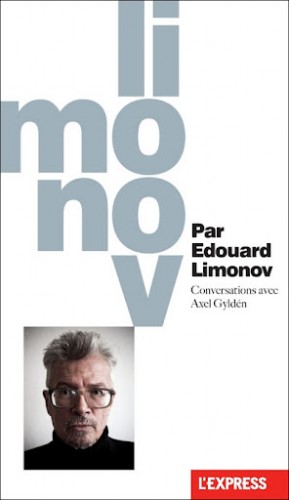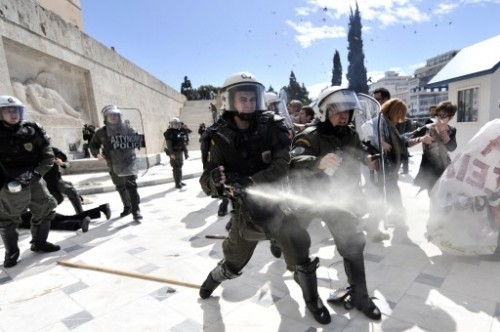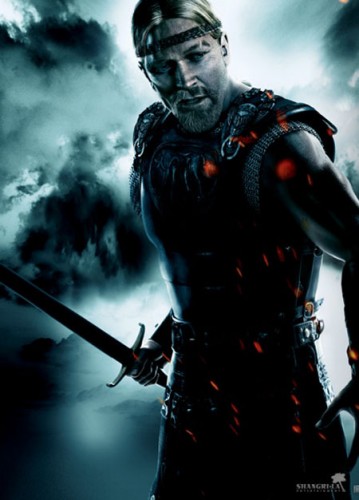Omniprésent sur terre et sur air, l’Emir de Qatar aura été incontestablement l’homme de l’année 2011, plus fort que Mohamad Bouazizi, dont l’immolation a déclenché le soulèvement salvateur du printemps arabe, réussissant le tour de force de retourner en sa faveur le cours de la révolution arabe.
Mais le nouvel Air and Field Marshall du Monde arabe, dans un mouvement de balancier, aura dans le même temps, sinistré l’une des principales réalisations de son régime, la chaîne transfrontière Al Jazira, passant du rôle envié de prescripteur de l’opinion arabe, à celui moins glorieux de lanceur d‘alerte des menées anti arabes de l’Otan, faisant voler en éclat, en six mois, une crédibilité patiemment construite en quinze ans.
«On the air» d’Al Jazira, l’autocrate intronisera l’égyptien Youssef Al Qaradawi en prédicateur électronique de la mouvance islamiste panarabe et maintiendra en couveuse, en réserve de la République, le tunisien Rached Ghannouchi, les deux flotteurs des Frères musulmans en exil, qu’il fera réhabiliter par les chancelleries occidentales, en les plaçant en orbite dans la foulée du renversement du président Hosni Moubarak (Egypte) et de Zine El Abidine Ben Ali (Tunisie).
A coups de pétrodollars et d’esbroufe, amplifiée par la force cathodique d’Al Jazira, à l’époque à l’apogée de sa crédibilité, il cautionnera une intervention occidentale en Libye, réintroduisant le loup dans la bergerie, en la personne d’Abdel Hakim Belhadj, l’ancien chef des brigades islamiques de Libye et nouveau gouverneur militaire de Tripoli.
En tandem avec le roman-enquêteur français Bernard Henri Lévy, qui lui dispute la palme pour 2011, les duettistes se vivront alternativement, successivement et cumulativement comme le nouveau Rommel du désert de la Cyrénaïque et le Von Paulus de la Tripolitaine, vivant quotidiennement les épopées conjuguées de la première armée d’Afrique et de l’Afrika Korps.
Depuis la mise à mort publique du Colonel Kadhafi, en octobre 2011, l’Emir du Qatar dont l’armée compte cinq mille soldats et autant de mercenaires, commande une coalition de treize pays comprenant trois puissances atomiques alignant plusieurs centaines d’ogives nucléaires, nouveau tour de force qui le propulse au titre très envié de commandant en chef d’une mythique Africa Korps nucléaire atlantiste. Avec les encouragements et les acclamations d’une cohorte de commentateurs politiques, dont le plus en vue n’est autre que l’universitaire franco-tunisien, l’Islamologue toulousain Mathieu Guidère, nouveau venu sur la scène médiatique, de son vrai nom Moaz Goueider, par ailleurs, précepteur du propre fils du souverain à l’Ecole Saint Cyr, l’académie française chargée de former les officiers de commandement.
En 1990, le Monde arabe avait offert au Monde un Field Marshall en la personne de Khaled Ben Sultan, l’interface saoudien du général Arnold Schwarzkopf, le maitre d’œuvre de la tempête du désert contre l’Irak. Bel exploit d’un pays qui bat tous les records en matière de dépenses d’armement sans jamais livrer de guerre directe. Le propre fils du ministre saoudien se distinguera, non sur le champ de bataille, mais sur le terrain de l’intendance, prélevant une respectable commission de l’ordre de trois milliards de dollars sur les transactions visant le ravitaillement des 500.000 soldats du corps expéditionnaire occidental venus protéger le pétrole saoudien des convoitises irakiennes. .
Bel exploit d’une principauté, le Qatar, dont le quart du territoire abrite la plus importante base américaine hors Otan, celle du commandement central, le maillon intermédiaire qui assure la jonction entre l’Otan (Atlantique Nord) et l’OTASE (Asie du Sud Ouest).
Parricide, le Field Marshall pétro monarchique s’emparera du pouvoir à Doha, à la faveur d’un coup de force des paras commandos jordaniens, en 1995, accourus au Qatar pour restaurer les intérêts pétroliers lésés des compagnies britanniques. Brutus n’est pas le monopole de Rome, il en pousse à l’ombre des derricks. Prédateur à l’instar de son prédécesseur, sa réconciliation avec le principal opposant à la dynastie, Nasser al Misnad, exilé au Koweït depuis 1950, sera scellée, périnéalement, par les épousailles de l’Emir avec la propre fille de son ancien ennemi, Mozza, la ci-devant Banana princess.
Rébus de luxe pour recyclage haut de gamme, béquille financière de la France, caution arabe du plus pro israélien des dirigeants français, son plus bel exploit demeure toutefois d’avoir retourné en sa faveur le slogan révolutionnaire lancé à l’aube du printemps arabe dont la pleine saveur se retrouve dans sa formulation en arabe par inversion du mot Kadar (Destin) par Qatar:
Si le peuple veut la vie, Il importe au destin (Kadar) d’y faire droit
Si le peuple veut la vie, Il importe au Qatar d’y faire droit
Le plus zélé disciple des Etats-Unis dans la mise à l’index des Républiques arabes, la Libye puis la Syrie, se tient bien car bien tenu. Prescripteur de l’information pendant deux décennies sur le plan arabe, Al Jazira, l’alibi stratégique suprême du Qatar face à sa sujétion à l’ordre occidental, parait devoir vivre la fin de son monopole médiatique en raison des dérives dont la chaîne qatariote s’est rendu coupable, lors de la couverture des révoltes arabes de l’an 2011, particulièrement en Libye et en Syrie.
Al-Jazira, dont le nom a été forgé par référence à «Al-Jazira Al-Arabia» la verdoyante péninsule arabique, l’espace géographique regroupant les principautés pétrolières du Golfe, l’Arabie saoudite et le Yémen, l’ancienne «Arabia Felix» (l’Arabie Heureuse) des premiers temps de l’Islam, est bel et bien en effet une excroissance rebelle de l’ordre médiatique saoudien, tout comme d’ailleurs sur le plan politique Oussama Ben Laden, une excroissance rebelle de l’hégémonie saoudienne sur l’ordre domestique arabe.
La mise en place d’Al Jazira a constitué un bel exemple d’équilibrisme diplomatique du petit émirat du Qatar, face aux ambitions des protagonistes du jeu régional et la tentative de domestication de la chaîne transfrontière arabe constitue à cet égard un cas d’école.
Son lancement en 1996, l’année qui a suivi la crise d’hémiplégie qui a frappé le Roi Fahd, le grand frère saoudien dont l’Emir parricide du Qatar en prenait ombrage, répondait à trois objectifs:
-Dédouaner aux yeux de l’opinion arabe l’Emir de Qatar de la lourde tutelle occidentale qui a parrainé son parricide politique.
-Doter la principauté d’une force de frappe médiatique dissuasive en vue de marquer son territoire sur le plan énergétique au sein de la constellation des pétromonarchies du Golfe
-battre en brèche l’hégémonie saoudienne sur la sphère arabe, en prenant partiellement appui sur une équipe journalistique formée hors orbite de la censure arabe, -le service arabe de la BBC (British Broadcasting Corporation)-, victime de l’arbitraire saoudien (1).
En moins d’une décennie, Al-Jazira a rempli ses objectifs, brisant le monopole du récit médiatique détenu par les médias occidentaux depuis l’avènement de l’information de masses, il y a un demi siècle, se propulsant au rang de grand rival des grands vecteurs occidentaux, le prescripteur de l’opinion publique arabe, l’artisan du débat pluraliste au sein du monde arabe. Une promotion qui a conduit les Américains à entreprendre méthodiquement sa domestication, particulièrement depuis la guerre d’Afghanistan.
Alors que les Etats-Unis mobilisaient l’opinion internationale pour l’invasion de l’Irak et cherchaient une base de repli à leur QG saoudien, un média saoudien laisse opportunément filtrer ce jour là, sur son site Internet «Arabic news.com», une information apparemment puisée aux meilleurs sources américaines et saoudiennes annonçant «une tentative de coup d’état» contre l’Emir de Qatar Cheikh Hamad Ben Issa al-Khalifa «déjouée par les Etats-Unis». L’information laconique ne mentionnait ni les auteurs de la tentative, ni la date à laquelle elle a été déjouée. Fomentée par qui? Déjouée comment? Tentative fomentée et simultanément déjouée par le même opérateur? Coup d’état par simulation virtuelle?
Quiconque connaît le fonctionnement de la presse saoudienne, particulièrement la censure en temps de guerre, pareille information bienvenue pour la diplomatie américaine et saoudienne n’aurait jamais pu filtrer sans l’assentiment des autorités de tutelle tant saoudiennes qu’américaines. Le message sera entendu par le Qatar qui dans un geste de bonne volonté signera le lendemain un accord de coopération avec le Paraguay, une prestation de service qui serait en fait une opération de couverture pour les services américains en Amérique latine.
La pression est de nouveau mise lors de la phase finale de l’offensive américaine en Irak: le 8 avril 2003, jour de la chute de Bagdad, l’hebdomadaire américain «Newsweek» annonce à grands renforts de publicité une information sans véritable lien avec la conduite de la guerre: le lancement d’une enquête pour corruption contre le ministre des Affaires étrangères du Qatar, Hamad Ben Jassem Ben Jaber Al Thani (alias HBJ), qui aurait été impliqué dans le courtage d’une affaire d’assurances et le blanchissement subséquent de cent cinquante millions de dollars sur un compte dans les Iles Jersey (Royaume Uni). Le choix de la cible n’est pas le fruit du hasard.
Un des vieux routiers de la vie politique du Golfe, Jassem est l’inamovible ministre des Affaires étrangères du Qatar depuis 1992, c’est-à-dire lorsque l’accusation est portée, depuis 11 ans, soit un homme qui a servi les deux derniers gouverneurs, le père et le fils. Fils aîné de Cheikh Jaber Ben Hamad, ancien Emir de Qatar, Jassem a d’ailleurs joué un rôle important dans le coup d’état pro anglo saxon qui a porté au pouvoir le nouvel Emir et passe pour être un homme sensible aux intérêts des firmes pétrolières anglaises et américaines.
A la tête d’une immense fortune, qui lui vaut le titre de l’homme le plus riche du richissime Qatar, situé à un niveau très élevé du hit parade des fortunes du Golfe, Cheikh Jassem est actionnaire de la compagnie aérienne qatariote «Qatar Airways» et du fond d’investissement «Qatari Diar», dont le fils du souverain le prince Tammim, en est le président.
Membre reconnu de l’Establishment américain, Cheikh Jassem est membre associé de la prestigieuse «Brooking Institution», spécialisée dans les études géostratégiques sur le Moyen orient, à ce titre un interlocuteur régulier des dirigeants israéliens, notamment de Mme Tzipi Livni, ancien agent du Mossad et ancien ministre israélien de affaires étrangères, et à ce titre futur coordonnateur des guerres destructrices israéliennes contre le Liban (2006) et contre l’enclave palestinienne de Gaza (2008).
Effet du hasard ? Cheikh Jassem assumera un rôle de pointe dans la mise à l’index de la Syrie, à l’automne 2011, dans une opération de déroutement de la révolution arabe des rives du golfe pétro monarchique vers la frange méditerranéenne du Monde arabe.
Le choix de la cible n’était nullement anodin. Il paraissait destiné à démonter la détermination des Etats-Unis à «caraméliser» quiconque se dresserait contre leur projet, jusques y compris leurs meilleurs amis, visant à faire taire toute critique à l’égard de l’invasion de l’Irak.
La neutralisation d’Al Jazira, dont ils caressaient le projet de bombarder son siège central, figurait alors comme leur cible prioritaire. Curieuse information qui apparaît rétrospectivement comme un contre feux alors que le bureau d’Al-Jazira dans la capitale irakienne était de nouveau la cible de dommages collatéraux de la part de l’artillerie américaine et que des informations persistantes faisaient état de l’implication de la firme Halliburton dont Dick Cheney en était le patron avant sa nomination au poste de vice président américain, tant dans des versements de pots de vin au Nigeria et que dans la surfacturation de prestations pétrolières en Irak.
L’affaire tournera court mais le message sera entendu. Le ministre qatariote des Affaires étrangères sera blanchi, promu même premier ministre, et, dans la foulée, l’Emir de Qatar annoncera l’éviction pour des liens présumés avec le régime de Saddam Hussein du Directeur Général d’Al-Jazira, celui là même qui avait été félicité par l’ambassadrice américaine lors du repas du Ramadan. Simultanément, le correspondant d’Al Jazira à Kaboul et Bagdad, Tayssir Allouni, était traduit en justice en Espagne pour ses présumés liens avec «Al-Qaîda et un des photographes de la chaîne, Sami al Hajj, était incarcéré pendant huit ans à Guantanamo, avant de se voir confier la direction d’un centre pour la défense de la liberté de la presse.
Du travail d’orfèvrerie: Le Qatar est dédouané au regard de l’opinion arabe, Al-Jazira confortée dans sa crédibilité alors que les américains obtenaient la mise sur place d’un PC opérationnel à Doha, au grand mécontentement de l’Arabie saoudite, courroucée de l’irruption soudaine de cette petite principauté dans la «Cour des grands». Un privilège obtenu aux prix d’une lourde servitude à l’égard de son grand tuteur américain, dont l’installation sur le sol de la principauté du siège du CENT COM, le commandement opérationnel des guerres américaines en terre d’Islam (Afghanistan, Irak, Yémen, Afrique orientale), porte garantie de la pérennité du régime, de la survie de la dynastie et du maintien sous souveraineté qatariote du gigantesque gisement gazier of shore North Dome, contigu de l’Iran.
Libye, Syrie: Un coup fatal à la crédibilité d’Al Jazira et du Qatar
Dans sa stratégie d’influence, ce micro-état a jeté son dévolu sur la France, se payant biens et personnes, un lot de son personnel politique. L’amitié avec Nicolas Sarkozy a d’ailleurs permis au président français d’éradiquer toute sensibilité pro arabe au sein de l’administration préfectorale et du dispositif audiovisuel français et la promotion concomitante de personnalités notoirement pro israéliennes. Il en est de même sur le plan international.
La révolte libyenne donnera l’occasion aux deux partenaires de se livrer à un duo diplomatique à projection militaire, qui permettra à Nicolas Sarkozy de se refaire une virginité politique après le calamiteux printemps arabe, et à l’Emir de Qatar de se donner l‘illusion de jouer dans la cour des grands.
La participation conjointe de la France et du Qatar à l’instauration d’une zone d’exclusion aérienne au dessus de la Libye, le 19 mars, 2011, a permis au plus pro israélien des dirigeants français de se dédouaner aux yeux de l’opinion arabe de son soutien aux anciens dictateurs déchus, l’Egyptien Hosni Moubarak et le Tunisien Zine el Abidine Ben Ali.
Le Qatar, lui, a payé le prix fort sa participation au châtiment de la Libye. En cautionnant le dirigeant français de la Vème République le plus honni du monde arabe, son crédit en a été affecté. Son association à ces manœuvres était en fait destinée à lui donner satisfaction, en lui offrant l’occasion de venger le directeur du service photo de la chaine transfrontière Al Jazira tué lors d’une embuscade tendue par le clan Kadhafi à Benghazi.
Tout au long de cette séquence, Al-Jazira a observé une retenue à l’égard du pays hôte, qu’elle n’a jamais interrogé ni sur les implications diplomatiques et mercantiles du duo aérien franco qatariote au dessus de la Libye, quand bien même le Qatar a confirmé ainsi sa vocation de base régionale de l’armée américaine et de banque de réserve occidentale, quand bien même il a apporté sa caution à une opération occidentale, soutenant partiellement son effort de guerre en s’engageant indirectement à trouver des ressources financières à l’effort de guerre inter libyen.
Saluée comme un levier de la révolution arabe, Al Jazira a suscité la suspicion dans sa couverture de la suite des événements, focalisant quasi exclusivement sur les régimes séculiers, les Républiques arabes, particulièrement la Syrie, occultant le Bahreïn.
Le syndrome Ahmad Chalabi
Réédition d’un scénario éculé, le dispositif en vigueur à l’encontre de la Syrie a été identique à celui mis en place à propos de l’Irak, justifiant une fois de plus le constat de Pierre Bourdieu sur «la circulation circulaire de l’information», tant au Qatar, à travers Al Jazira, qu’en France, via le quotidien Libération.
Ainsi Ahmad Ibrahim Hilal, responsable de l’information sur la chaîne transfrontière qatariote, a agi depuis les combats de Syrie, il y a un an, en couple et en boucle avec son propre frère Anas Al Abda, proche du courant islamiste syrien et membre du CNT, au diapason du tandem parisien formé par Basma Kodmani, porte-parole du CNT et sa sœur Hala Kodmani, animatrice du cellule oppositionnelle syrienne à Paris et chargée de la chronique Syrie au quotidien français Libération dans une fâcheuse confusion des genres.
Ce dispositif, amplifié en France au niveau arabophone par Radio Orient, la radio du chef de l’opposition libanaise, Saad Hariri, qui plus est partie prenante du conflit de Syrie – du jamais vu dans les annales de la communication internationale- a frappé de caducité le discours médiatique occidental au même titre que le discours officiel syrien, en ce qu’il est obéré par «le syndrome Ahmad Chalabi» du nom de ce transfuge irakien qui avait alimenté la presse américaine des informations fallacieuses sur l’arsenal irakien, via sa nièce journaliste en poste dans l’une des principautés du golfe, implosant la crédibilité de l’employeur de la journaliste vedette du New York Times, Judith Miller, passée à la postérité comme étant «l’arme de destruction massive de la crédibilité du New York Times dans la guerre d’Irak».
Sous l’apparence de l’indépendance et du professionnalisme, Al Jazira a épousé les oscillations de la diplomatie qatariote, d’abord enthousiaste à l’égard de l’élan populaire arabe, plus réservée lorsque les flammes de la contestation ont atteint les rivages pétro monarchiques.
Al Jazira s’est ainsi révélée fidèle à la discrétion qu’elle avait observée auparavant à propos de la présence sur son sol de la mission commerciale israélienne. Pis, elle occultera complètement le fait significatif de la duplicité du Qatar, le manège diplomatique de Nicolas Sarkozy, le 5 Mai 2011, d’une rencontre secrète à l’Elysée entre le premier ministre israélien Benyamin Netanyahou et son homologue du Qatar, dans la foulée d’un entretien direct de Nicolas Sarkozy avec son ami israélien. L’honneur est sauf, pensait-elle, au prix de quelques aménagements avec la liberté d’expression.
A l’intention de la direction d’Al Jazira sur la visite secrète de l’Emir du Qatar en Israël pour un complément d‘information de ses téléspectateurs : http://www.youtube.com/watch?v=nleBzEyzoV8/
Signe d’un désaveu, sa couverture parcellaire du soulèvement arabe provoquera une cascade de démission au sein de sa chaîne, du jamais vu dans les annales de la communication internationale, dont certaines des figures emblématiques d’ Al Jazira, notamment Ghassane Ben Jeddo, le populaire directeur du bureau de Beyrouth, la syrienne Lona Al Chebl, le libanais Sami Kleib, auparavant, quatre présentatrices vedettes de la station dont Joummana Nammour, et dernier et non le moindre, la présentatrice vedette de la chaîne, Imane Ayyad, qui claquera la porte dénonçant le rôle trouble de sa chaine «fauteur de troubles et de désordre» dans le Monde arabe (2).
En service commandé, le directeur de l’Information, Waddah Khanfar, un islamiste gendre par alliance de l’ancien premier ministre jordanien Wasfi Tall, le bourreau des Palestiniens lors du septembre noir d’Amman en 1970, sera remercié, fusible d’un «sale» boulot (3). Et le prédicateur Youssef Qaradawi, la caution jurisprudentielle des équipées atlantistes en terre arabe, interdit de séjour en France, dommage collatéral de l’affaire Mohamad Merah, le tueur fou de Toulouse et de Montauban, en mars 2012, en pleine campagne présidentielle française.
Dans la brèche ouverte de sa crédibilité se sont engouffrés trois nouveaux vecteurs aux ambitions redoutables: «Sky Arabia», dont le lancement est prévue, en mars 2012 , à Abou Dhabi, avec la collaboration de la chaine britannique Sky GB du magnat australien Ruppert Murdoch, «Al Arab» du prince Walid Ben Talal, depuis Manama en collaboration avec la firme Bloomberg, ainsi que la chaîne «Al Mayadine» de Ghassane Ben Jeddo, l’ancien d’Al Jazira.
Au vu de ce déferlement, le golfe pétrolier paraît devrait être le théâtre tant d’une guerre médiatique que psychologique. Mais, si dans les pays occidentaux, les grands groupes de communication sont adossés à des conglomérats dépendant, dans une large mesure des commandes de l’Etat, les vecteurs transnationaux arabes sont, eux, carrément adossés à des bases militaires occidentales.
A l’exception d’ «Al Mayadine», la chaîne du dissident d’Al Jazira, Ghassane Ben Jeddo, qui «se refuse à être le porte voix de sinistres dirigeants corrompus, partisans d’intervention étrangère contre leur propre pays, ni le soufflet de l’incitation à la haine confessionnelle», toutes les chaînes transfrontières du Golfe sont, en effet, adossées à des bases occidentales: Al Jazira du Qatar au Centcom, le commandement central américain, Sky Arabyia d’Abou Dhabi, à la base aéronavale française, «Al Arab» du prince saoudien Walid à la base navale de Manama, quartier général de la V me flotte américaine de l’Océan indien…….. une singularité des pétromonarchies… sans doute la marque de leur indépendance.
«Islam des lumières versus Islam des ténèbres» dans ses diverses variantes est la ritournelle favorite du Qatar pour masquer son engagement. «La culture de la vie versus la culture de la mort», «l’axe de la modération contre l’axe de l’intolérance», dans la même veine, se révéleront, en fin de compte, comme autant de déclinaisons d’une même face, celle qui exalte la logique de la vassalité à l’ordre israélo américain, face à la contestation de la logique de la soumission.
Un enfumage conceptuel en ce que «l’Islam des lumières» cautionnait le vicieux protocole de validation d’un islam domestiqué à l’ordre israélo américain.
Arbre qui cache la forêt de la sujétion à l’ordre occidental, Al-Jazira apparaît quinze ans ans après son lancement comme l’alibi stratégique suprême de la dynastie Al Thani face à la mainmise américaine sur la souveraineté du Qatar et sur les sources de ses revenus, deux éléments qui hypothèquent lourdement et durablement l’Indépendance d’un pays faussement présenté comme non-conformiste, mais qui remplit toutefois pleinement sa mission de soupape de sûreté au bellicisme américain à l’encontre du monde arabe et musulman.
Promu désormais à la fonction de «lanceur d’alerte» de la stratégie anti arabe des pays occidentaux, Al Jazira a ainsi sinistré, en l’espace d’un semestre, sa propre réputation patiemment bâtie pendant quinze ans, et, sabordé, du même coup, son monopole des ondes panarabes. Par «le fait du prince» et le fait de son maître.
Références
1-Le noyau originel de l’équipe d’Al-Jazira a été constitué par des vétérans du service arabe de la BBC TV réduit au chômage du fait d’une rupture de contrat saoudien avec la chaîne saoudienne orbit partenaire de la chaîne arabophone anglaise. Faisant une sérieuse entorse à sa politique générale d’information, BBC a cédé à une cour assidue de M. Khaled Ben Mohamad Ben Abdel Rahman, patron du Holding al-Mawarid. Elle s’est associée avec ce proche parent du Roi Fahd pour lancer la première chaîne de télévision d’information continue en langue arabe avec le label de la chaîne britannique et les moyens de diffusion de la firme saoudienne «Orbit». L’idylle, de courte durée, 18 mois, se brisera sur le fracas des récriminations réciproques entre deux conceptions monarchiques apparemment inconciliables.
Les Saoudiens ont d’abord imposé un prix prohibitif du décodeur de l’ordre du dix mille dollars, instaurant une sorte de censure par l’argent, puis prenant ombrage de l’hospitalité accordée par BBC TV à l’opposant saoudien en exil à Londres, Mohamad al-Massari, un physicien très populaire dans sa région d’origine, la région pétrolière de Dammam, ont abrogé le contrat, mettant sur le tapis près de deux cents employés arabophones.
En guise d’épilogue à ce psychodrame d’une alliance contre nature, l’opposant saoudien sera finalement exilé vers les Bahamas, le Royaume Uni perdra dans la foulée un contrat militaire de plusieurs milliards de livres sterling et la firme Orbit conduite à payer une pénalité de l’ordre de cent millions de dollars pour rupture abusive du contrat.2- Pour le lecteur arabophone, ci-joint le lien sur les manipulations d’Al Jazira à propos de la couverture des évènements de Syrie. http://www.al-akhbar.com/node/44875
Ainsi que la protestation du correspondant de la chaîne au Japon, le syrien Fadi Salameh, déplorant le recours quasi systématique aux correspondances de l’opposition syrienne dans la couverture des événements dont les approximations et les intoxications ont entrainé de graves erreurs d’appréciation et surtout l’assassinat de plusieurs membres de de son village http://www.al-akhbar.com/node/610993- Waddah Khanfar, Natif de Djénine a épouse la nièce de Wasfi Tall, l’ancien premier ministre jordanien surnommé le «boucher d’Amman» pour sa répression des Palestiniens lors du septembre noir jordanien (1970).
Deux reproches ont pesé sur gestion de huit ans à la tête d’Al Jazira (2003-2011): sa volonté d’imposer un code vestimentaire ultra strict aux présentatrices de la chaine, en conformité avec l’orthodoxie musulmane la plus rigoureuse (ce qui a entrainé la démission de quatre journalistes femmes), ainsi que sa publication des documents confidentiels sur les pourparlers israélo palestiniens «The Palestine Paper», discréditant les négociateurs palestiniens ; ce qui a conduit le chef des négociateurs palestiniens, Saeb Oureikate, à réclamer sa démission ; de même que l’Arabie saoudite effrayée par la crainte que la large couverture des soulèvements arabes par la chaîne du Qatar n’ait des répercussions sur la stabilité des petro monarchies.
Ancien journaliste de la chaine gouvernementale américaine «Voice of America» a été propulsé à la direction de la chaîne Al Jazira par son ami libyen, Mohammad Jibril, qui appartenait au même courant islamiste que le palestinien. Propriétaire de JTrack, entreprise de média training chargée de former les dirigeants du Monde arabe et d’Asie du sud à la maitrise du langage médiatique, Mohamad Jibril a exercé des responsabilités gouvernementales au sein du Conseil National de transition libyen, lors de l’intervention atlantiste ayant entrainé la chute de Kadhafi.





 del.icio.us
del.icio.us
 Digg
Digg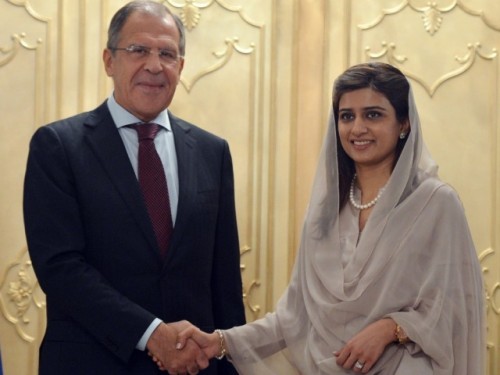
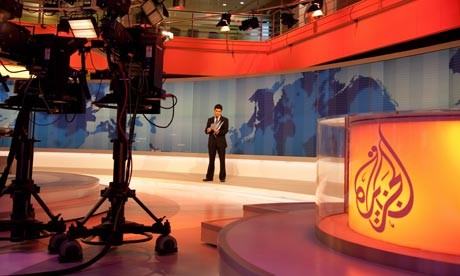
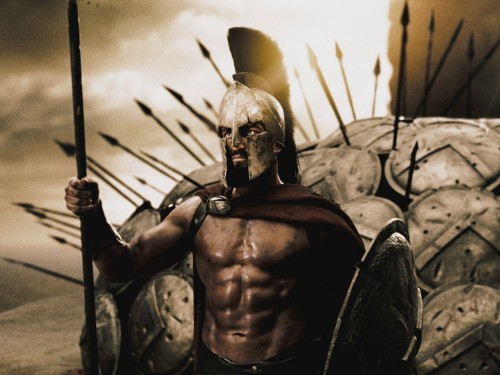



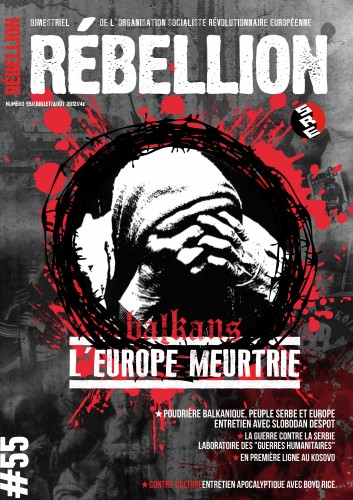


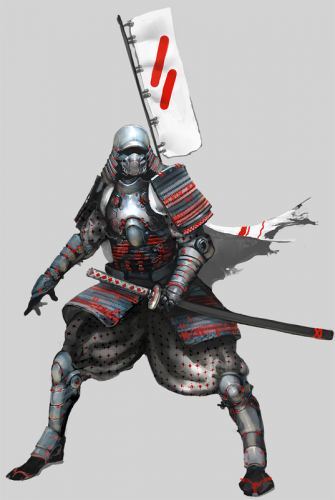
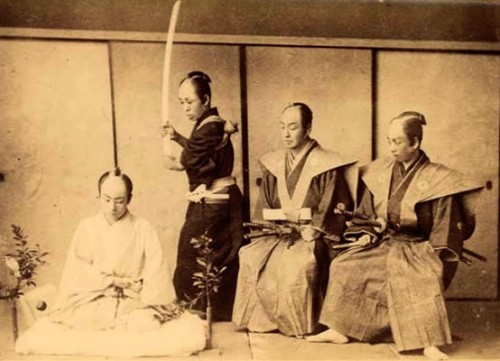

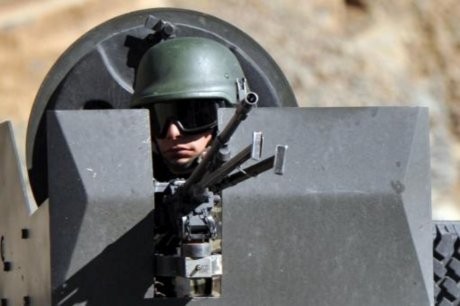
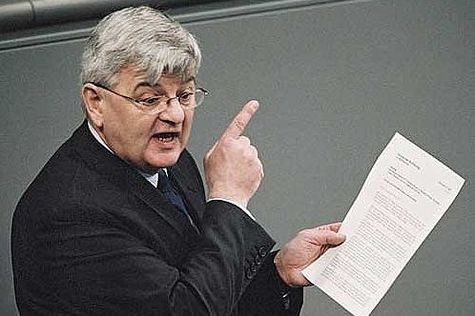
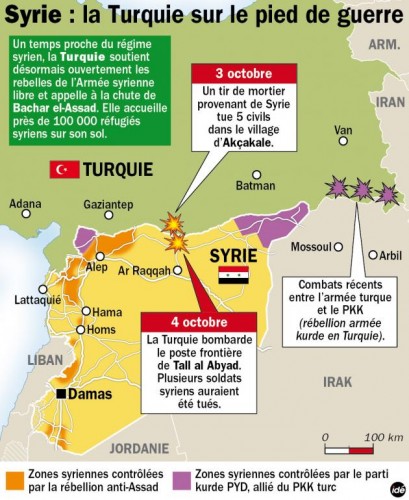
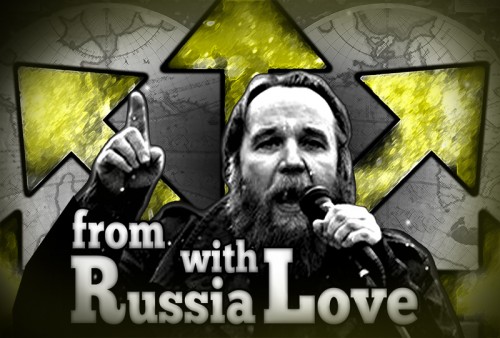
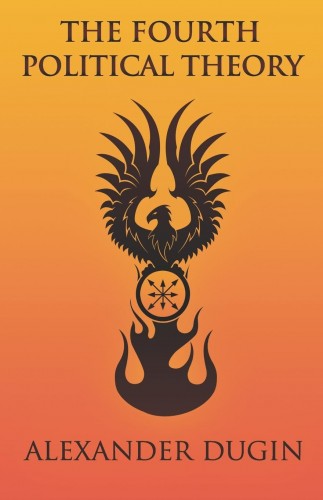 Despite past attempts by the Second and Third Theories to claim the crown of modernity, Dugin believes that Liberalism has triumphed here and has managed to irrevocably present itself as the only truly “modern” way. It has also succeeded in presenting itself as the “natural order,” rather than a mere ideology.
Despite past attempts by the Second and Third Theories to claim the crown of modernity, Dugin believes that Liberalism has triumphed here and has managed to irrevocably present itself as the only truly “modern” way. It has also succeeded in presenting itself as the “natural order,” rather than a mere ideology.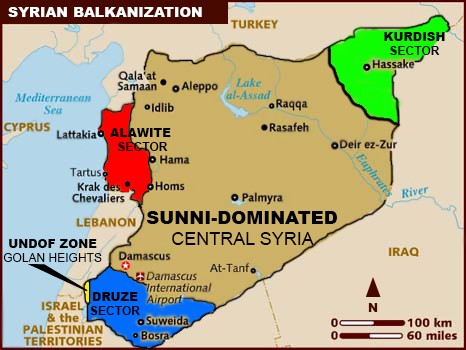

 Jacques Ellul, l’auteur du Système technicien et du Bluff technologique, disait qu’il lui devait tout. Il y a peu, on a parlé de
Jacques Ellul, l’auteur du Système technicien et du Bluff technologique, disait qu’il lui devait tout. Il y a peu, on a parlé de 










